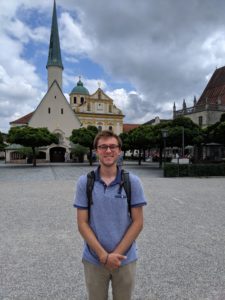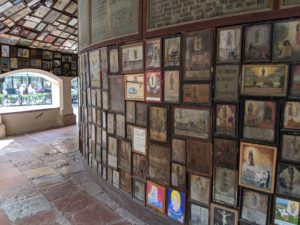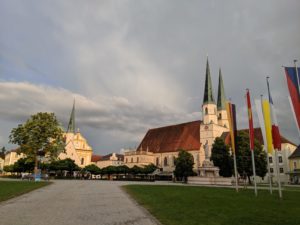“Das Herz Bayern,” “the heart of Bavaria” is a lovely and entirely fitting moniker of Altötting, Germany, where I have decided I will certainly retire when I have made my millions. A beloved town of Pope Benedict XVI, whose childhood home in the nearby town Marktl am Inn I was also fortunate enough to visit, Altötting has found a special place in my heart with its timelessness, its smallness, and its unique devotion to the Blessed Virgin Mary. Bavaria is the most Catholic state in Germany, and Munich has a number of interesting roots in the Catholic Faith; however, it wasn’t until I visited Altötting that I could see a people really grounded in their love for Christ and in such profound way.

Altötting has become a regular pilgrim site for a number of Catholics from all over the world due to the steadfastness of its patron, Our Lady of Altötting, the mother of Jesus. Many have come from near and far seeking healing through the intercession of Our Lady, and many, after visiting the real center of the town, Gnadenkapelle, which houses a beautiful statue of “Die Schwarze Madonna,” “the Black Madonna,” have received their sought-after healing. In fact, both inside and outside, paintings thanking Mary for her intercession line nearly every wall, leaving hardly any view of the wood on which they hang. Most say something to the effect of, “Maria hat uns geholfen. Tausend Dank,” “Mary helped us. A thousand thanks!” Not only do these paintings exist as proof of her aid, but on a cross outside the chapel hang a number of crutches, braces, and canes which were no longer needed after their users’ trip to the Gnadenkapelle. The devotion was penetrating.

Outside of Altötting, however, the Christian influence remains in the number of public Christian holidays, some of which are observed only in Bavaria, others all throughout Germany. Since I have been in Germany, I have gotten off from school on three separate occasions due to public Christian holidays. In fact, today, June 20, is “Fronleichnamstag,” or Corpus Christi, a public holiday for all of Bavaria. However, what intrigues me is that, upon talking with a number of people about the holiday, no one knows what it’s all about. The priest celebrating Mass today explained it in the context of today’s Gospel reading from the Gospel of Luke in which Jesus feeds a couple thousand people with no more than five loaves of bread and two fish. Corpus Christi is an especially Catholic celebration of the Body and Blood of Christ, really present in the Eucharist, the spiritual food through which one may be sustained by Christ. My teacher in the Carl Duisberg Centrum, a native of Munich, nor any of my classmates whose homes span four different continents knew why we had the day off (Admittedly, I was also unaware of the real significance of the holiday). The mother of my host family also did not understand the holiday, nor was she surprised that most people were unsure of its significance either despite the fact that the entire state gets off of work for the entire day for it. Although Bavaria is largely culturally Catholic, indeed with its large number of practicing Catholics, Munich, most of Bavaria, and all of Germany are growing largely secular, with many people leaving Catholicism and Christian faiths of all kinds. I have found no real explanation for this trend, however, but I look to places like Altötting with confidence that the heart of Bavaria beats strong.

Maria hat uns geholfen. Tausend Dank. Bitte, hilfe uns weiter!